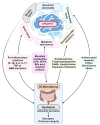Exploring the Frontier: The Human Microbiome's Role in Rare Childhood Neurological Diseases and Epilepsy
- PMID: 39595814
- PMCID: PMC11592123
- DOI: 10.3390/brainsci14111051
Exploring the Frontier: The Human Microbiome's Role in Rare Childhood Neurological Diseases and Epilepsy
Abstract
Emerging research into the human microbiome, an intricate ecosystem of microorganisms residing in and on our bodies, reveals that it plays a pivotal role in maintaining our health, highlighting the potential for microbiome-based interventions to prevent, diagnose, treat, and manage a myriad of diseases. The objective of this review is to highlight the importance of microbiome studies in enhancing our understanding of rare genetic epilepsy and related neurological disorders. Studies suggest that the gut microbiome, acting through the gut-brain axis, impacts the development and severity of epileptic conditions in children. Disruptions in microbial composition can affect neurotransmitter systems, inflammatory responses, and immune regulation, which are all critical factors in the pathogenesis of epilepsy. This growing body of evidence points to the potential of microbiome-targeted therapies, such as probiotics or dietary modifications, as innovative approaches to managing epilepsy. By harnessing the power of the microbiome, we stand to develop more effective and personalized treatment strategies for children affected by this disease and other rare neurological diseases.
Keywords: drug-resistance epilepsy; epilepsy; gut–brain axis; microbiome; microbiome-epilepsy; rare childhood disease; rare childhood neurological diseases.
Conflict of interest statement
The authors declare no conflicts of interest.
Figures
References
Publication types
LinkOut - more resources
Full Text Sources


